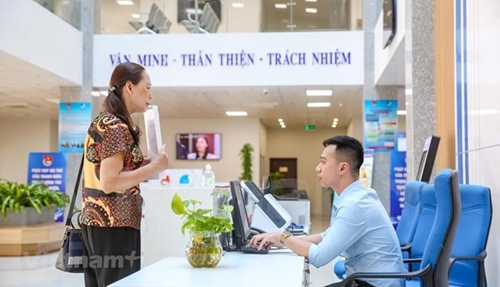This is the second time Quang Ninh has held the highest position in the 12 years the PAPI survey has been conducted in Vietnam.
The province was followed by the Southern province of Binh Duong, and the Central province of Thanh Hoa. Meanwhile, the Northern mountainous province of Cao Bang was at the bottom.
    |
 |
|
A woman conducting administrative procedures in Quang Ninh |
Vietnam’s efforts to overcome the socio-economic impacts of the unprecedented health crisis in 2022 translated into increased economic confidence at household and national levels. In a notable turnaround, 66.1% of the respondents viewed the national economy as “good” in 2022 – a 19.4% leap from a year earlier, while there was a 13.7% drop in citizens assessing conditions as “bad” from 19.8% in 2021 to only 6.1% in 2022. Similarly, at the household level, fewer citizens reported their economic situation was “poor” (11.4 versus 15.3% in 2021).
Despite this progress, some scarring from the health crisis was evident. While 56% of the respondents confirmed their economic conditions were better in 2022 than a year earlier (52%), aside from 2021, this percentage in 2022 was still the lowest since 2012. Similarly, those suggesting that their economic conditions were worse rose to their highest levels since 2012, except for 2021. This underlined that many respondents are still feeling the lingering pain of the economic damage by the pandemic, with ethnic minorities and women most acutely impacted given the higher prevalence of poverty and vulnerable employment among them.
The transition to the post-pandemic era is also reflected in health and health insurance as 2021’s issue of greatest concern plummeting from 23.84 to 6.38% to be overtaken by poverty/hunger (22.13%) – perennially at the top of the list since 2015, aside from pandemic-hit 2021.
With a record 16,117 respondents randomly selected from all of Vietnam’s 63 provinces and cities, PAPI is in a unique position to deliver invaluable insights into government performance at all levels two years into its 2021-2026 term and actualize the 2023 legislative agenda.
The index is a policy monitoring tool that assesses citizen experiences and satisfaction with government performance at the national and sub-national levels in governance, public administration and public service delivery. Following the initial pilot in 2009 and a larger survey in 2010, the PAPI survey has been implemented nationwide each year since 2011. For the 2022 PAPI Report, 16,117 randomly selected citizens were surveyed. In total, 178,243 Vietnamese citizens nationwide have been directly interviewed for PAPI since 2009.
PAPI measures eight dimensions: participation at local levels, transparency, vertical accountability, control of corruption, public administrative procedures, public service delivery, environmental governance and e-government.
Quang Ninh also topped Vietnam’s Provincial Competitiveness Index (PCI) 2022, as announced in the PCI 2022 report by the Vietnam Chamber of Commerce and Industry (VCCI) on April 11.
This is the 6th year in a row it has topped the charts. It was followed by Bac Giang, Hai Phong, Ba Ria - Vung Tau and Dong Thap.
Source: VNA